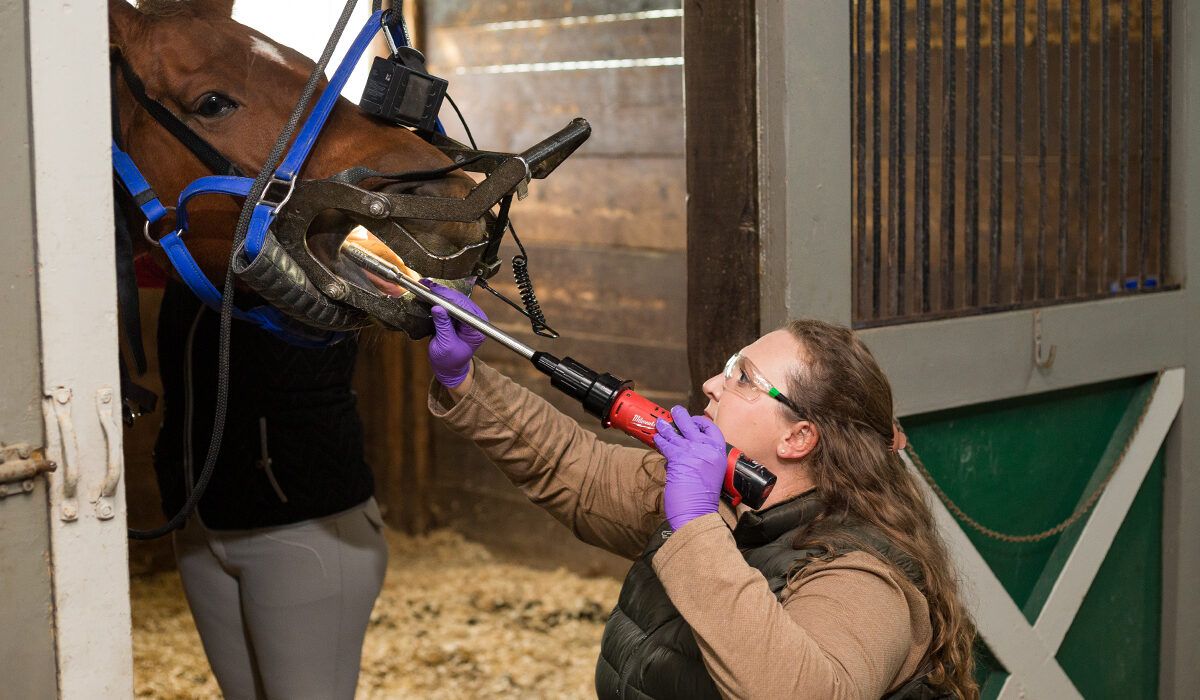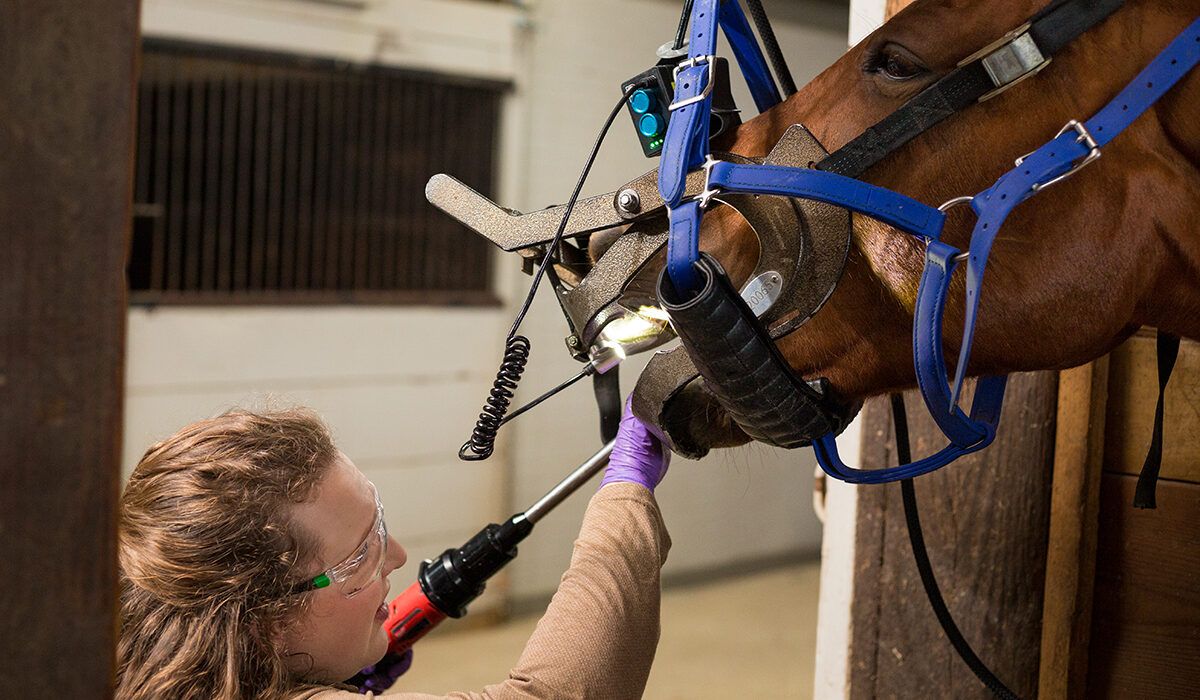Equine Dentistry & Floating Teeth
Properly caring for your horse’s teeth can add years to their lives. Dental care is recommended annually, beginning at one year of age, for a number of reasons. Even when a horse is young they can develop very sharp enamel points that can cause ulcerations, or sores, in their cheeks. To get your horse started right, it is essential that dental issues are resolved prior to beginning a young horse’s training with a bit.
Common oral problems – such as wave mouth, retained caps and wolf teeth – are easily corrected when detected early. Throughout the course of a horse’s life and work, routine check-ups are crucial for equine well-being; dental issues that go unchecked can lead to fractured or infected teeth, both of which are painful to your horse and costly to fix. Even geriatric horses need regular dental care because they are more likely to have loose, missing, or infected teeth.
Just because there aren’t many sharp points to float doesn’t mean that older horses don’t still need a full sedated exam or float. Regardless of their age, many horses with dental problems have no outward signs, which is why a routine preventative exam is so important. In short, the better your horse’s teeth are, the better your horse can chew, and the longer – and happier – their life can be!
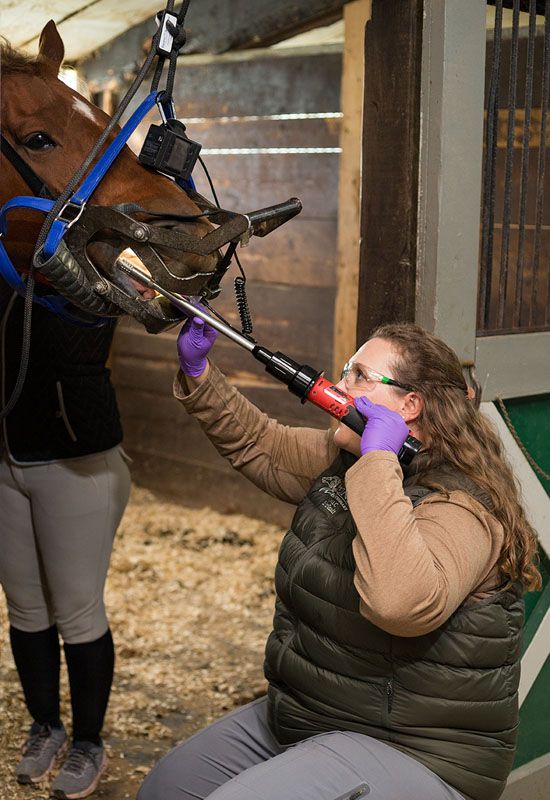
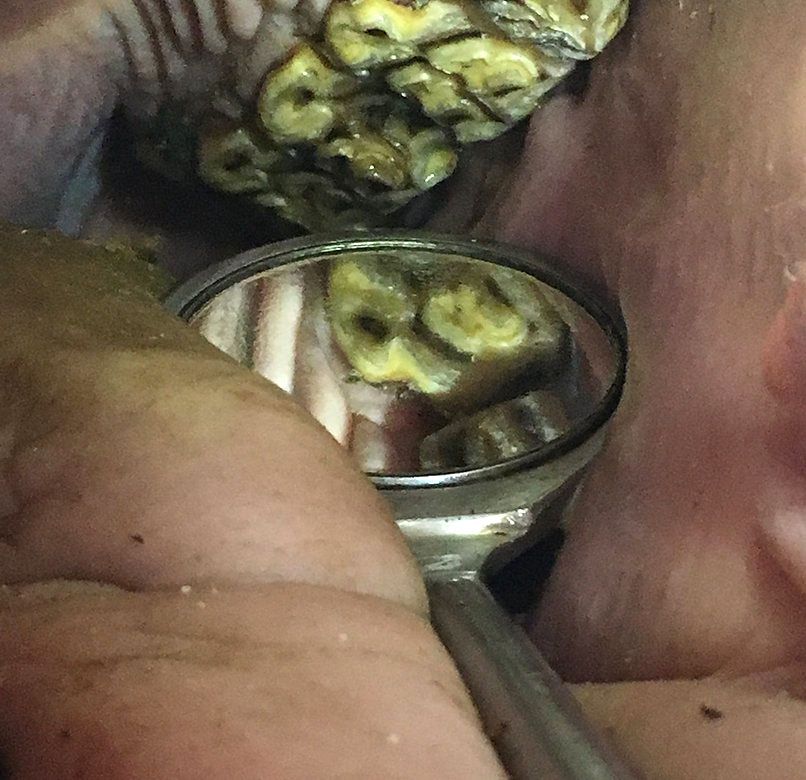
Importance of Equine Dental Care
All horses should have a full dental examination every year. Signs that your horse needs an exam may include: weight loss, dropping grain, creating wads of hay that fall out of the mouth, trouble riding with a bit, nasal discharge, a lump or swelling on the face, or a foul smell from the mouth or nose. Keeping your horse’s teeth floated regularly can prevent them from creating painful cheek ulcers and experiencing uneven tooth wear, and can protect them from choking on their feed or having an episode of colic.
Oral Exams
All horses need a sedated oral exam – using a bright light, a dental mirror, with a speculum to hold the mouth open – at least once a year. Anything less than this standard of care reduces your veterinarian to “educated guesses” as to whether your horse needs a full exam and float. Horses can’t open their mouths very far and their teeth go surprisingly far back into their mouth, essentially creating a “black hole” if not examined with the right tools.
An added challenge is that horses are usually eating and frequently retaining hay or grass in their cheeks, making seeing or feeling the status of their teeth very difficult while they are awake. Checking the teeth while the horse is fully awake sometimes agitates the horse, and of course is an easy way for the veterinarian’s hand to accidentally be bitten.
Sedation makes the procedure safer and more pleasant for all involved. A comprehensive sedated oral exam can pick up minor problems before they become major. Good equine dental care is about so much more than just floating sharp enamel points!
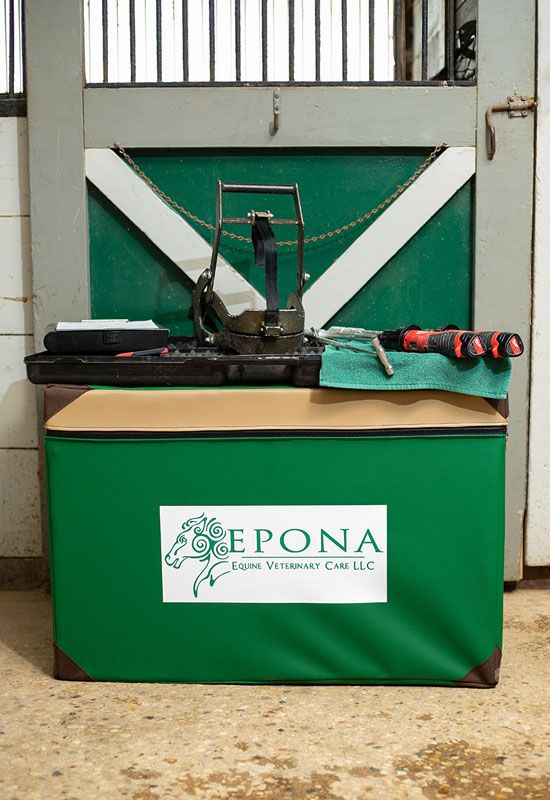
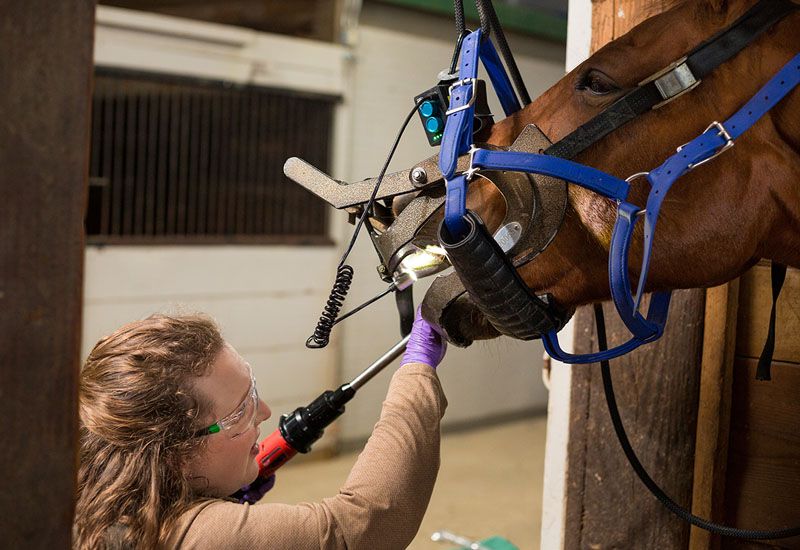
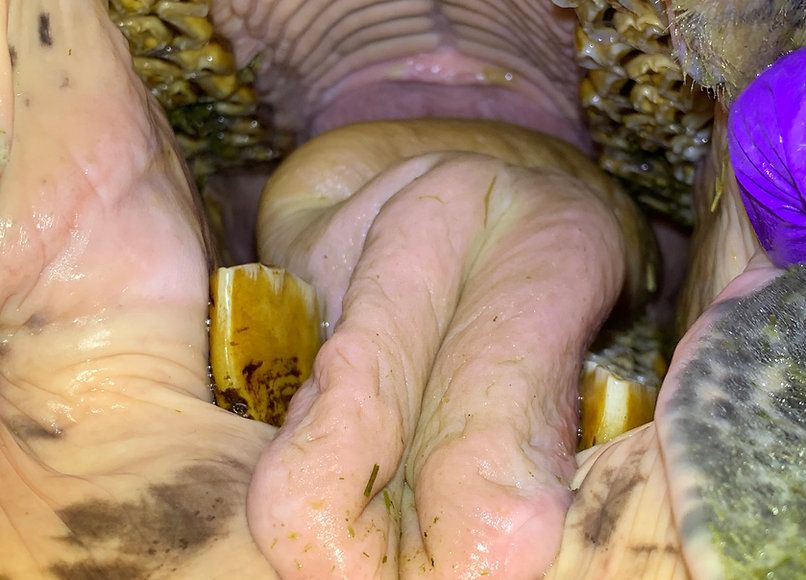
The Procedure of Floating
Floating your horse’s teeth is quick and painless. Your horse will be sedated so they can stand quietly and comfortably while they are examined and floated. For most horses the procedure itself takes only 20-30 minutes. The modern equine dental speculum used at Epona Equine is light and opens with a strap instead of ratchets. This allows the mouth to be opened to your horse’s individual comfort level. The power dental tools used are battery-operated, lightweight, and quieter than most other power tools. After your horse is floated, they will need to rest in a stall with no food for an hour. Most horses can go back to riding the very next day.
Hidden Mouth Problems
Even horses in good body condition can be hiding problems in their mouths. Some horses are very expressive and show problems with the bit, dropping feed, or have weight loss when they have mouth pain. However, because horses are a prey species, some hide their “weakness” very well and continue to try eating despite extreme dental problems. The picture shown here is of a gelding who is in very good body condition, but has sharp enamel points, ulcers in the cheeks, and a severe malocclusion.
Equine Dentistry FAQs
Does my horse need to be sedated for a dental?
Yes, in order to do a complete oral exam and float, horses must have sedation. Sedating horses is safe after a quick exam including listening to the heart. It is important that the horse doesn’t move their head around so that precise locations and amounts of tooth can be removed with the dental tools. Sedating the horse helps prevent the horse from hurting themselves or the people around them.
Can you check my horse’s teeth without sedating him?
Checking a horse’s teeth without sedation is not advised. It doesn’t allow for a complete evaluation of the horse’s teeth. At best, sharp enamel points can be felt on the first few cheek teeth. Many times lots of other problems are found farther back in the mouth than what was able to be felt just checking without sedation. The goal is to have your horse have a positive, quiet experience. A sedated oral exam is always preferable to an un-sedated one. If your horse doesn’t have any sharp points or overgrowths to address we would simply not float the teeth after the initial exam.
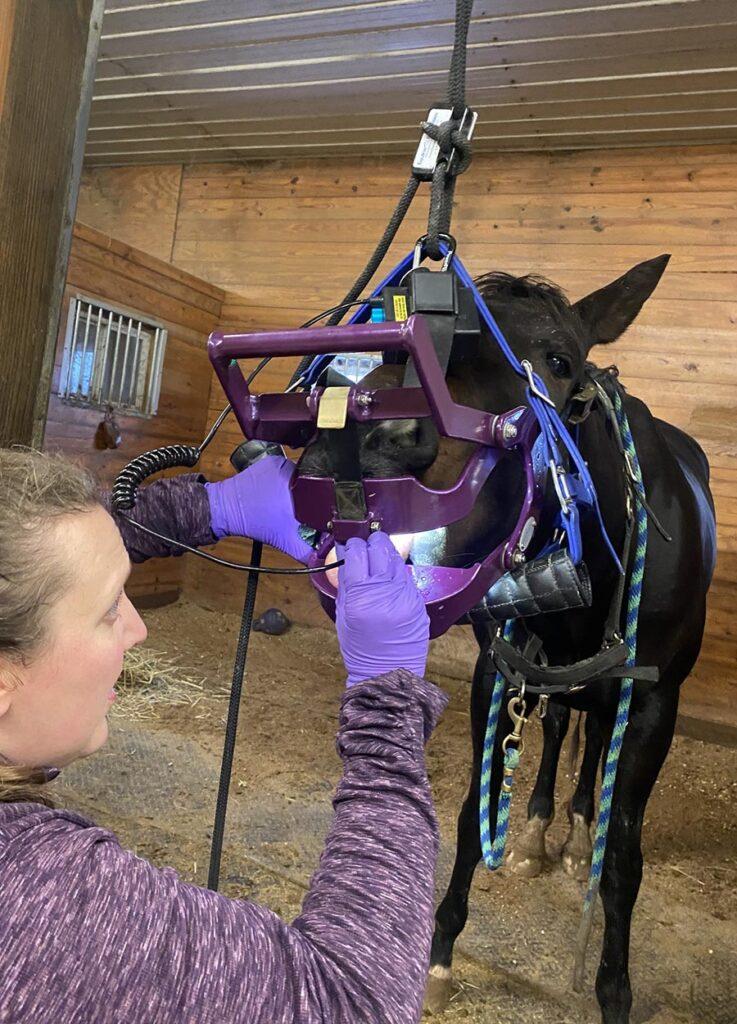
Do you use power tools?
Yes, Epona Equine uses power tools to float horse teeth. The equipment used allows for a quick but thorough job smoothing down the sharp enamel points or reducing overgrowths of the teeth. An old myth is that power dentistry tools will heat up the tooth and cause damage to the tooth but this is not the case with modern tools. The dental procedure goes much faster, the horse doesn’t have to have their mouth open as long. More precise corrections to the tooth can be made with power tools as opposed to hand floats.
Will you need electricity for the dental equipment?
No, all of the equipment is battery operated. It is even OK if your stall doesn’t have bright lights. A very strong light is used that goes directly into the horse’s mouth and allows for excellent visualization of the teeth.
Where should we work on my horse’s teeth?
A stall or wash rack is the preferred place to float your horse’s teeth. The most important thing is to have a non-slip, even surface for your horse to stand. Ideally an overhead beam such as a stall door can be used for the dental halter. If there isn’t an overhead beam, a portable stand to rest the horse’s head is available. A smooth, even surface in front of the stall is always appreciated so that a rolling stool can be used too.
Book an Appointment
All services are by appointment only.
Serving the greater Milwaukee area in Wisconsin with seasonal availability in the Northwoods Wisconsin. Serving clients in Dodge, Jefferson, Washington, Waukesha, Milwaukee, Walworth, Ozaukee and Racine counties.
Available Monday – Friday from 9am to 5pm
Please avoid a $50 cancellation fee by rescheduling or cancelling your appointment 1 full business day in advance.
Please call for availability or fill out the contact form..
414-379-2464
